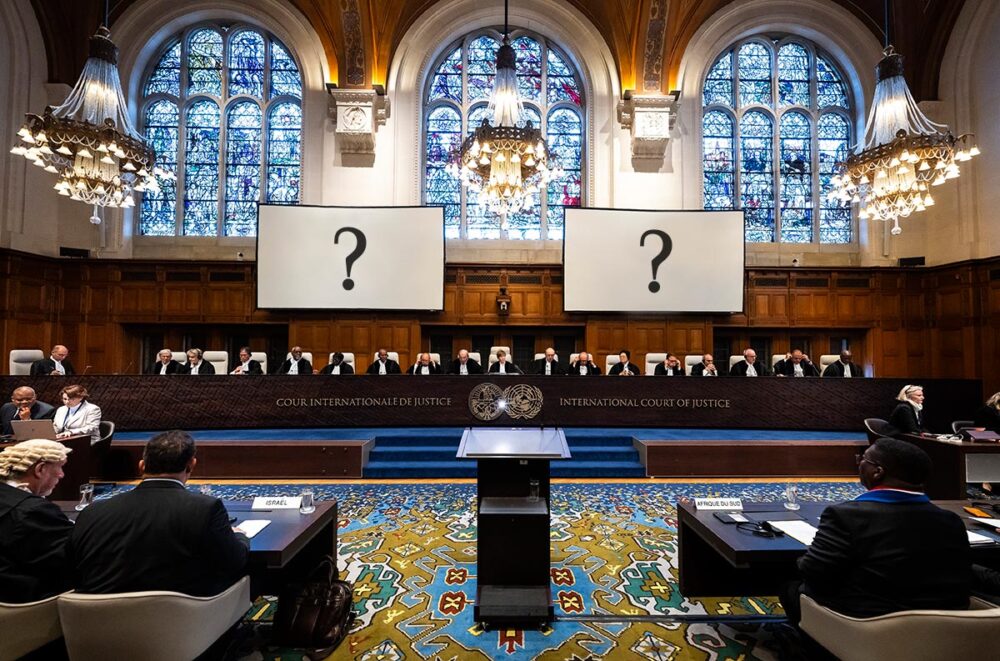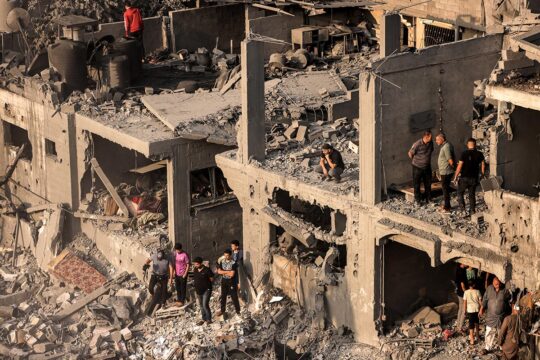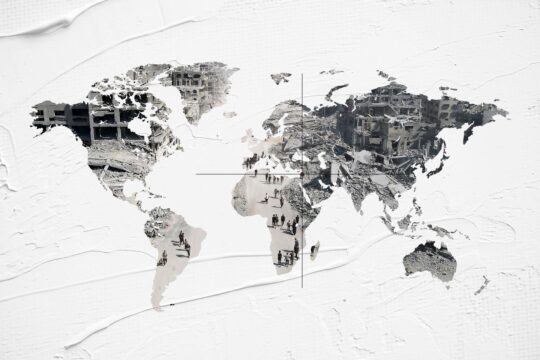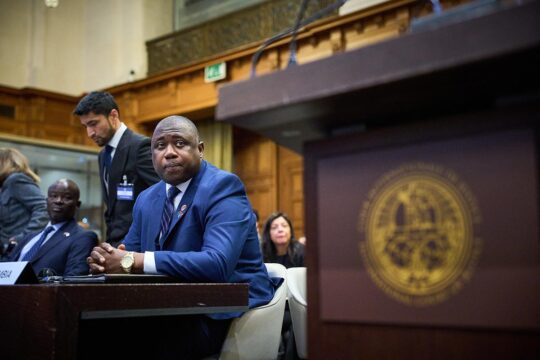On February 19, the United Nations Court will once again plunge into the heart of the Israeli-Palestinian conflict. The hearing for its legal opinion on Israel’s occupation of the Palestinian territories follows the South African genocide case against Israel earlier this year, where provisional measures orders were issued to prevent a plausible risk of genocide in the war in Gaza. But this legal request precedes it in the chronologically, having originated in a UN General Assembly resolution adopted on 30 December 2022, following the conclusions of a UN Commission of Inquiry.
Since then, some 4.000 documents from this commission in particular have been transmitted from New York to The Hague. 57 countries and international organisations have submitted written legal arguments. 55 legal teams will present their arguments within the Great Hall of Justice before the 15 judges of the International Court of Justice (ICJ), including 6 newly elected colleagues and a new Lebanese president and Ugandan vice president. All to ask the judges their opinion on two questions about the legality of Israel’s occupation of Palestine: what are the legal consequences of the Israeli occupation of the Palestinian territories and what should states do about it [read box].
“One of the big missing pieces”
What the judges say will not be binding on Israel, which is not addressing the court, but will be “very important”, says Chantal Meloni, professor at the University of Milan as “one of the big missing pieces”: examining the situation in Palestine “under the lens of international humanitarian law”, when set against the backdrop of other legal interventions in the past months.
“I am pleased,” says to Justice Info Navanethem Pillay, the South African head of the independent inquiry into Palestine set up by the UN Human Rights Council, that the UN General Assembly “listened to our report” in 2022 – in which the commissioners outlined all the different UN resolutions and recommendations on Palestine which “have not been implemented”. As a result of that report, a majority of states voted to ask the ICJ for its opinion.
The invasion in Ukraine in 2022 also spurred developments, says Victor Kattan, a professor of international law at the University of Nottingham. “The Palestinians saw Russia invade Ukraine. And the Americans saying ‘this is aggression. It's illegal, annexing territory’.” Sanctions were imposed on Russia. “Palestinian argued, he says, ‘we've been occupied for half a century, and our land has been annexed in East Jerusalem and the Golan Heights and the Americans and the Europeans don't do anything’. There was frustration with what they see as double standards”. That frustration tapped into the longer-term disputes at the UN to bring this question to the ICJ.
Expectations for the world legal order
Back in 2004, the UN court provided an opinion on the building by Israel of a wall to contain the security threat posed by Palestinians. At that time, the court unambiguously said that the Israeli project of settlement building in the West Bank was illegal and that Israel was in violation of its obligations under international humanitarian law. But despite the World Court legal opinion, “nothing happened”, acknowledges Kattan.
This time, the questions has been phrased to encompass much more than settlements, but also prolonged occupation, annexation, demographic changes, and that precise framing provides clues as to the underlying intentions of the advisory opinion request. Expectations for the world legal order are higher.
“Back in 1949” says Meloni, when the Geneva Conventions were drafted, “no-one would imagine that at a certain point, there will be such a situation where you have a prolonged occupation”. Geneva Convention IV does not make occupation lawful or unlawful in international laws of war. But an occupation does have “certain characteristics, limitations and purposes”, of which one of the main ones is that “it is temporary, limited,” says Meloni.
“We were very convinced that the perpetual nature of the occupation position renders it unlawful now,” says Pillay. “That’s why we asked the General Assembly to get an advisory opinion on that one issue - lawfulness. And secondly to spell out the responsibilities of states who cooperate with this unlawful endeavour,” she adds.
What kind of legal framework are we in today?
The settlement enterprise, started in 1967, is “now so big and impossible to undo”. Israel has, “imposed facts on the ground”, Meloni says. But to her, despite this, international humanitarian law (IHL) should continue to be applied – and in particular, the Fourth Geneva Convention that “gives the rights of the protected population, in this case, the Palestinian people”. “At the same time, let's face reality. Israel never accepted, to be de jure the occupying power”, she adds. By asking the judges to examine this situation, the question implicitly asks “whether we are still falling under this [IHL] legal framework or not. And if not, what kind of legal framework are we now talking about?” says Meloni. “Here's the point that for me becomes very, very relevant.”
Any ruling by the judges that IHL is no longer the acceptable framework for a 50-plus year occupation could “have further ramifications both in terms of a state responsibility and in terms of individual criminal responsibility,” says Meloni. The International Criminal Court (ICC) began its investigation into Palestine in 2021 and at the time parked it, under then prosecutor Fatou Bensouda, while asking judges to consider which territory it could investigate. But some details of the scope of the investigation were made public, she recalls, including settlements and the potential war crime of transfer of civilians. “It would be very surprising to me if they were not, looking seriously at it,” says Meloni, who is representing Palestinian victims at the ICC.
“A decision will end this political deadlock”
Several human rights organisations and some of the United Nations bodies have described the situation of Palestinians under occupation as akin to apartheid. The questions in front of the International Court of Justice does not mention apartheid, but “the elements asking about ‘related discriminatory legislation’ are, I think, a nod to the apartheid claim”, says Kattan.
In the end, agrees Meloni, “this is what we are talking about. This is what would be the logical conclusion of an advisory opinion”. To her, the judges could conclude that “the situation on the territory, for its features, for the time, for all the characteristics, is not any more just a situation of military occupation, but is something different”. A ruling could strengthen the arguments that this “is a de facto situation of apartheid, which can have further ramifications both in terms of a state responsibility and in terms of individual criminal responsibility, again, potentially in front of the International Criminal Court, which has an open investigation,” continues Meloni.
That legal conclusion could also have implications for Palestinian statehood and peace negotiations. The UN court hearings come against the backdrop of increased international focus on the war in Palestine in which nearly 30,000 civilians are estimated to have lost their lives, after the Hamas raids killing more than 1,000 Israelis on October 7, 2023. According to Kattan, western states are discussing the possibility of recognising the state of Palestine “and of course, the UK wouldn't do it alone”. Such a move would be seismic, he says, providing Palestinians a range of rights as individuals and as the state with sovereign immunity, right of self-defence and territory. Currently, under the arrangement including the Palestinian Authority’s limited mandate, they have few rights. The court delicately acknowledges in its 2004 Wall opinion that it was “aware” of the “greater whole” of peace negotiations, but rejected western states arguments that therefore it should not exercise its jurisdiction.
This legal action, suggests Meloni, “is meant to arrive at some conclusions to show that there can be one or the other, but you must have either a state or recognise the rights of the Palestinian people that are living de facto under apartheid under Israeli rule”. A determination by the court, “will end this political deadlock,” says Pillay “contrary to what people say, that they oppose the referral to the ICJ because they felt it could interfere with the peace process - as if there's been some brisk peace process going on - my view and the Commission's view, is, in fact, that this judicial opinion will advance the process of achieving peace in the Middle East”.
The questions the International Court of Justice (ICJ) has to answer
On 30 December 2022, the United Nations General Assembly adopted resolution 77/247, by which it decided to request the International Court of Justice to render an advisory opinion on the two following questions:
- What are the legal consequences arising from the ongoing violation by Israel of the right of the Palestinian people to self-determination, from its prolonged occupation, settlement and annexation of the Palestinian territory occupied since 1967, including measures aimed at altering the demographic composition, character and status of the Holy City of Jerusalem, and from its adoption of related discriminatory legislation and measures?
- How do the policies and practices of Israel referred to in paragraph 18 (a) above affect the legal status of the occupation, and what are the legal consequences that arise for all States and the United Nations from this status?”








